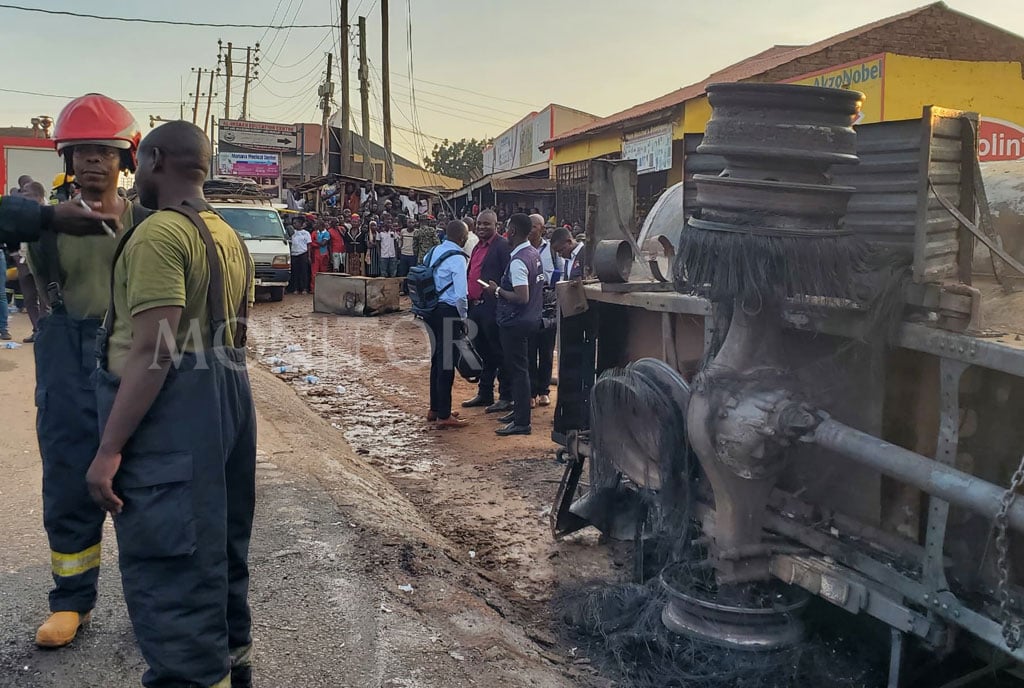By Edgar Barigye Kugonza
Today, I join the rest of Ugandans in mourning the loss of beloved ones in the Kigogwa fuel tanker tragedy. On October 22, 2024, a devastating fuel tanker explosion ripped through Kigogwa Township along Bombo Road, leaving a trail of unimaginable sorrow. Over 11 innocent lives were lost, and several others suffered grave burns, their futures forever altered.
As I reflect on this heart-wrenching incident, I am reminded of the countless families torn apart by the sudden and senseless loss of loved ones. Parents who will never see their children smile again, children orphaned by the tragedy, and spouses left to pick up the pieces of shattered dreams.
Uganda has experienced a worrying trend of fuel tanker accidents. In 2013, a fuel tanker exploded in Namungoona, Kampala, killing 3 people and injuring several others. In 2015, a fuel tanker caught fire in Jinja, killing 2 people and destroying several vehicles. In 2016, a fuel tanker overturned in Mbarara, spilling fuel and causing widespread damage. In 2018, a fuel tanker explosion in Kyambura, western Uganda, claimed 19 lives and injured several others. In 2019, a fuel tanker burst into flames in Kampala, killing 2 people and injuring several others. Furthermore, in 2020, a fuel tanker exploded in Mbale, killing 1 person and injuring several others. These incidents underscore the urgent need for increased safety measures.
Outside Uganda but still in Africa, there have been other fuel tanker tragedies. Nigeria has experienced two major incidents: a 2012 explosion in Rivers State that killed 95 people and injured over 100, and a 2015 explosion in Lagos that claimed 15 lives and destroyed several vehicles. Other incidents include the Democratic Republic of Congo’s 2010 explosion that killed 230 people and injured over 200, Tanzania’s 2019 Morogoro explosion that killed 71 people and injured 176, Kenya’s 2018 Nairobi explosion that killed 13 people, Ghana’s 2017 Accra explosion that killed 5 people, South Africa’s 2018 Johannesburg explosion that killed 7 people, Egypt’s 2019 Cairo explosion that killed 3 people, and Cameroon’s 2020 Yaoundé explosion that killed 4 people.
Beyond Africa’s borders, other countries have faced similar fuel tanker disasters. In 2019, a fuel tanker explosion in Gujarat, India, killed 10 people and injured several others. The United States experienced a fatal explosion in Texas in 2020, killing 2 people and injuring several others. Brazil, Indonesia, and Pakistan have also faced devastating fuel tanker explosions, resulting in significant loss of life and property.
The dangers of fuel tanker accidents are terrible. When a fuel tanker overturns, a catastrophic sequence of events unfolds, releasing large quantities of fuel that quickly form vapors. These vapors spread rapidly, creating a highly flammable atmosphere. The slightest spark can ignite the vapors, leading to a massive explosion.
The consequences of such an explosion are devastating. A fireball engulfs the surrounding area, consuming everything in its path. The fuel continues to burn, spreading the fire and intensifying its ferocity. The immediate blast claims numerous lives, while survivors suffer severe burns and respiratory issues. The environmental damage is also extensive, with fuel spills contaminating soil, water, and air.
To prevent such heinous incidents, it is crucial to implement robust safety protocols. This includes regular maintenance of fuel tankers and storage facilities, proper training for personnel handling fuel, public awareness campaigns on fuel safety, and efficient emergency response systems.
It is true that complacency can be deadly, especially when it comes to fire safety. After 16 years of tireless advocacy through Parents Brigade, educating institutions about the perilous risks of operating without fire extinguishers, I have come to a startling realization: prioritizing safety is not inherently ingrained in our culture. Despite relentless efforts, many still overlook the gravity of safeguarding human life, leaving communities vulnerable to devastating fire-related incidents. The consequences are heartbreaking, and the losses irreparable. However, I remain resolute in my conviction that change is possible. Authorities must persist in their crusade to sensitize the public, and sustained awareness campaigns can shift mindsets, cultivating a culture of vigilance.
So in conclusion, the Kigogwa township fuel tanker explosion serves as an emotional reminder of the importance of prioritizing safety. As we mourn the loss of precious lives, let us recommit to preventing such devastating accidents from occurring in the future. May the memories of those lost inspire us to create a safer, more compassionate Uganda for all. Let us draw lessons from these tragedies and work together to ensure that our communities are protected from the risks associated with fuel transportation. By doing so, we can honor the memories of those lost and build a brighter, safer future for generations to come.
The author is CEO Pamoja Communal Empowerment Network EMAIL: pamojauganda72@gmail.com
Send us your story or opinion on: dailyexpressug@gmail.com. You can also follow Daily Express on WhatsApp for all the latest news and updates.


